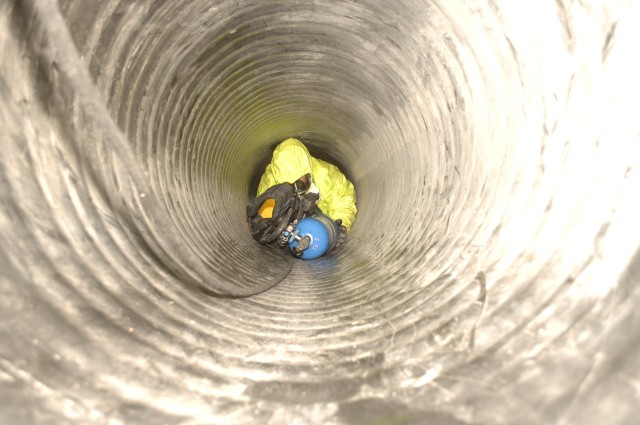FORT LEONARD WOOD, Mo. - Crawling through a dark, damp rabbit warren of constrictive tunnels in suffocating heat while wearing a gigantic plastic suit and sucking air out of a 30-pound self-contained breathing apparatus on your back is few people's idea of a good time.
At the U.S. Army Chemical, Biological, Radiological and Nuclear School's Technical Escort Course, it's just another day on the job for CBRN warriors.
"It (confined space training) was cool," said Staff Sgt. Harold Ross, 3rd Brigade, 7th Infantry Regiment, Fort Stewart, Ga. "When I signed up for the course, I didn't expect to train on (railcar) derailment, chlorine or HAZMAT. If you are a chemical guy, this is the place you want to be."
While the course is relatively new to Fort Leonard Wood, technical escort has been a part of the Army's mission for more than 50 years.
"Technical escorts used to do a lot of transfer of chemical weapons and demilitarization of chemical weapons in World War II," said Marine Gunnery Sgt. Gabriel Reese, Technical Escort instructor.
The course is still in the process of moving to Fort Leonard Wood. Currently, courses are taught in two locations.
"The Technical Escort Course is split between here and Redstone Arsenal, Ala., and at the end of the fiscal year, the course will consolidate up here," Reese said.
While at the course, students spend 25 days learning how to handle a HAZMAT situation in the field, contain the HAZMAT and transport it to another location.
"Tech escort skills include (HAZMAT) remediation, disabling, sampling, identification and escorting," said Staff Sgt. Amanda Graves, Technical Escort instructor.
During the Technical Escort Course, students learn confined space operations, chemical accident incident and response assistance, leak-seal-pack (how to seal up leaks and package the HAZMAT), HAZMAT transportation, and mission recovery and decontamination, said James Lawrence, Technical Escort instructor.
One student shared his view of what a tech escort service member does.
"Part of our deal as chemical, biological, radiological and nuclear specialists is weapons of mass destruction elimination operations," said Marine Chief Warrant Officer Scott Malott, Marine Aircraft Group 11, Okinawa, Japan. "If bad guys use anything against us, we can identify it, pack it up and mitigate the risk to us."
The course classes range from academic studies such as learning permeation rates of certain hazardous materials, to hands-on exercises like getting into Level B containment suits and crawling through a mock cave complex.
"This course is the beginning of the journey - it's a cross between an overview and the bare basics," Lawrence said. "On a mission, they can have confidence in their equipment and training. (But) to get fully certified in technical escort, it can take up to a year of schooling."
Technical escort is a complex mission with many possible real-world scenarios. Students spoke of reacting to anthrax attacks, derailed train cars spilling toxic contents and wartime threats.
The students in the course saw immediate relevancy to their military occupations.
"Often in training you can never really get close to combat conditions," Malott said. "This training is more realistic and closer to the actual event.
"In confined space operations, especially with Afghanistan, you operate in the unknown environments like a cave complex," Malott continued.
The students shared how they would take their training back to improve their units.
"This course expands skill sets," Malott said. "It gives a good baseline for a foundation of training. We use it to develop local standard operating procedures and build on this cornerstone of training."
The Technical Escort Course trains every branch of service, as well as active duty, Reserve and National Guard components. The class graduating, June 26, has a mix of Army, Marine and Air Force service members, both active and reserve components, working as a team to accomplish the tech escort exercises.
Malott talked about attending class with other military service branches.
"Joint training has evolved," Malott said. "Most operations in Iraq and Afghanistan are joint operations through and through. It's the wave of the future. Where we go there won't be just a Marine or just an Army thing. So seeing how each service works - it's been a good experience."
(Carolyn Erickson is a photojournalist with the Fort Leonard Wood GUIDON.)
-30-


Social Sharing